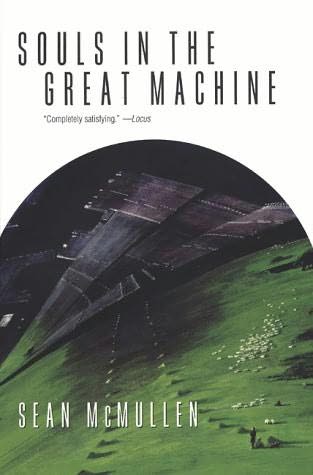
Souls in the Great Machine
Sean McMullen
448 pages
published in 1999
Sean McMullen is an Australian science fiction writer, whose first books were only published there, with Souls in the Great Machine being the first one available in the rest of the world. Apparantely it's a rewrite of two earlier McMullen novels, Voices In The Light and Mirrorsun Rising, which were of course only available in Australia. In any event, Souls in the Great Machine is the first novel (or indeed anything) I've read of McMullen, after the local science fiction bookstore had it and its sequel, The Miocene Arrow available cheap. Because of good reviews in Locus and elsewhere I thought I'd take a gamble.
On the whole I think Souls in the Great Machine was worth the gamble, though I had some caveats. The writing isn't always as smooth as you would like and the overall plot is a bit ...episodic shall we say, which may of course be a result of it having started as two separate books. The most bothersome aspect of McMullen's writing however is his sudden and rather frequent switch of viewpoints. Usually even with authors who like to jump from character to character you still get a good sense of who the heroes of their stories are, but with this book there are several perspective shifs which abandon the character you thought was the protagonist for someone else entirely. This feels a bit sloppy, but is more than made up for by the inventiveness McMullen displays in his depiction of the world of Souls in the Great Machine.
Said world lies some 2,000 years in our future, in a post-apocalyptic Australia, having regressed from the technological heights of the 20th/21st century: electronical equipment for example is no longer used, as that calls down the wraith of the orbiting death machines left over from some forgotten war. Unlike most post-apocalyptical futures McMullen has not let history be completely forgotten: there is a continuity with our own history. This immediately makes the future McMullen shows that much more real to me. It's just one small aspect of the world he has created, but it shows he has put some thought in it.
Don't worry if you think it may be too realistic: McMullen has also incorporated some very big and innovative science fiction ideas. The Australia of the future is subject to the Call, a periodic phenomenon that drives all animals larger than a cat to drop everything and move in one direction, switching off all free will, stopping only if physically restrained or dropping dead. Society has evolved around this Call, with people wearing Anchors that automatically fire when the Call happens and stop you from wandering off, Mercy Walls around the cities and villages that stop you from moving further and buildings without doors or windows in the direction of the Call.
Another important aspect of this future Australia are the Libraries, the new centres of learning sprung up after the apocalypse, part university, part library, the most important of which, Libris is located in Rochester, the capital state of the Southeast Alliance. It is here that Highliber Zarvora, the highest Library authority has set up a new project, the Calculator, which will change the world forever. It is here where McMullen shows his genius, by reinventing the computer in a very surprising and interesting manner. I'm not sure it could work in reality, but in theory his Calculator is a proper computer, only in a very unusual medium... Much more I would not like to say about it as that would spoil the surprise.
The plot, such as it is, revolves around this Calculator and the machinations that built up around it. This plot moves about a bit in a stop and start manner. It starts out quite leisurely, only to skip several years at several times in the novel while, as I mentioned before, switching viewpoints. This makes the novel somewhat less satisfying than it could've been.
Nevertheless, this is, if not necessarily a good novel, at least an interesting novel, with a distinct approach to some very old science fiction standbys. I enjoyed it greatly despite its flaws.
Read more about:
Sean McMullen,
Souls in the Great Machine,
science fiction,
book review